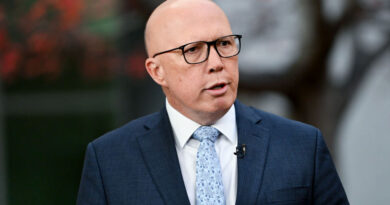Reform UK Shows Significant Progress in Scotland in 2026 According to Polls
With its growing influence, Reform UK plans to contest by-elections and expand its political footprint in Scotland ahead of the 2026 elections.
Reform UK could become the kingmaker in Scotland, as polls suggest it could win up to 15 seats in next year’s Holyrood elections.
The former Brexit Party, led by Nigel Farage, could go from zero seats in the 2021 election to playing a pivotal role in shaping the balance of power in the Scottish Parliament in 2026.
Scotland’s Reform organiser Martyn Greene told The Epoch Times that while the party doesn’t have a seat target, it’s “delighted” with the polling figures. He highlighted the party’s growth, with 8,000 members and 30 branches across Scotland.
“Within the last few years, we’ve went from having no presence to establishing a national presence with branches,” said Greene.
Commenting on the emerging trend, the former Scottish Conservative director of communications, Andy Maciver, suggested it is driven by voters on the unionist right who feel failed by the mainstream parties.
If Reform’s vote sticks, Holyrood may struggle to find two parties that can together command a Holyrood majority, he warned.
Scottish Conservative leader Russell Findlay said he understands voter frustration but cannot control defections. Scottish Labour’s deputy leader Jackie Baillie claimed Findlay has lost control of his party and dismissed Reform as offering nothing to Scots.
However, Greene insisted the Scottish political establishment should take Reform and voter sentiment seriously.
“People are fed up with the lack of leadership in the country and the broken promises, not just in Scotland, but Westminster as well,” he added.
Scottish Parliament
Former Reform strategist Gawain Towler told The Epoch Times that the Reform number would be “vital” in any votes in the Scottish Parliament, particularly on unionism.
He highlighted the outcome of the first council by-election of 2025, in Bannockburn, where Reform placed third, ahead of the Greens and Lib Dems, and where the issue of independence remains a dividing issue.
“Reform won’t be voting with Labour and SNP on an awful lot of things. But when it comes to key constitutional questions, those Reform votes and seats can have a significant impact,” Towler said.
Scotland’s Holyrood elections use a mixed voting system, with 129 MSPs. The local MSPs (73 seats) are chosen by the candidate with the most votes, while the regional seats (56 seats) are shared to help smaller parties.
A poll carried out for the The Herald by Find Out Now suggested the SNP would win 51 seats, while Reform would secure nine.
The SNP, led by First Minister John Swinney, still leads polls with 53 seats and will likely need allies to govern.
Whether a pro-independence bloc can be formed depends on the success of Alba Party politicians, who in the last election failed to win any seats. Another key question is whether the SNP would be open to collaborating with the rival pro-independence party.
Meanwhile, Scottish Labour has ruled out forming a coalition with the SNP after next May’s vote.
Greene said that the issue of independence was settled in 2014, when Scotland voted to remain part of the UK. He noted that younger voters are more interested in education, health, tax, job opportunities, and housing.

Grangemouth petrochemical plant in Grangemouth, Scotland, on Dec. 9, 2021. PA
Net Zero
As Reform gains momentum in Scotland, questions arise over what policies the party would implement should it secure Holyrood seats in 2026.
Reform opposes Scotland’s net zero policies, calling them a “punishing and costly agenda.” The party wants to cut subsidies for renewables and boost oil and gas production.
According to Greene, the close of Grangemouth “really hit home to a number of people,” with people across Scotland resonating with how important the oil and gas sector is for the local economy.
“Scotland is colder than England, and these cuts drive people away from mainstream parties,” he added.
Impact on Economy
In 2022, oil and gas extraction contributed £25.2 billion (11.8 percent of GDP) to Scotland’s economy. Renewable energy leaders argue their industry will drive future growth, with a £10.1 billion contribution in 2021.
Andrew MacNish Porter, head of economics and markets at Scottish Renewables, told The Epoch Times that clean energy is key to achieving net zero, energy independence, and lowering consumer bills.
Only 35 percent of Scots believe the 2030 clean energy target is realistic, but many support clean energy and new infrastructure like pylons. However, according to Greene, there is local opposition and frustration with pylons.
Only 24 percent of Scots think the windfall tax, introduced by the Conservatives and later extended by Labour, has lowered energy bills. Just 26 percent believe it helps companies switch to renewables.
Labour aims to reinvest tax revenue into green projects, but growing calls—including from the Trump administration—advocate expanding North Sea drilling to boost energy security.
Russell Borthwick, CEO of the Aberdeen and Grampian Chamber of Commerce, criticised the lack of strategic clarity in UK energy policy. He warned that while Clean Power 2030 presents opportunities, progress is hindered by slow grid expansion and bureaucratic delays.
Immigration and Taxation
Reform UK’s first 100-day plan focuses on strict immigration controls by freezing non-essential immigration, limiting asylum claims, and deporting foreign criminals after their sentences.
Greene acknowledged immigration’s role in boosting high-skilled workers, but warned that current volumes are unsustainable and hinder integration.
“What we can’t have, is the sheer volume of immigration now is, you know, can’t integrate that many people into society, into our culture,” he said.
On business and taxation, Reform proposes raising the corporation tax threshold to £100,000, cutting the main rate to 15 percent, and scrapping IR35 rules for the self-employed.
Scottish taxpayers face higher rates at certain income levels. For instance, the higher rate in Scotland is 42 percent starting at £43,663, compared to England’s 40 percent rate starting at £50,271.
Greene would like to see this policy reversed. He added that Reform would also like to raise the income tax starting threshold to £20,000 from the current £12,570, to “put more money in people’s pockets.”
Going forward, the party pledged to develop
Source link





